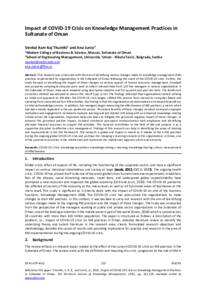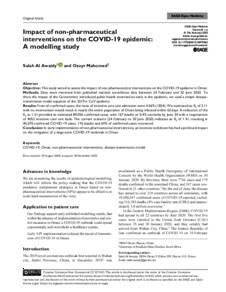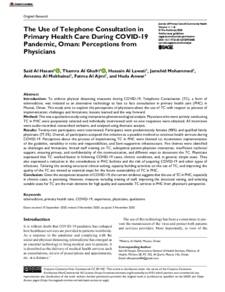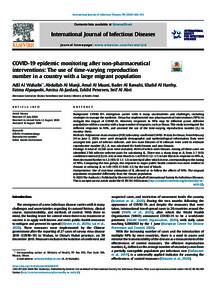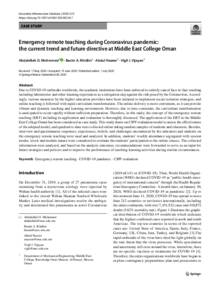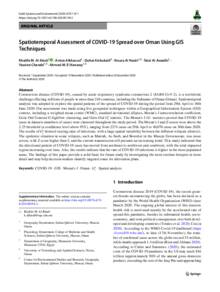Document
Impact of COVID-19 crisis on knowledge management practices in Sultanate of Oman.
Identifier
DOI: 10.34190/ejkm.19.3.2102
Source
Electronic Journal of Knowledge Management. v. 19, 3, p. 213-225
Contributors
Jurcic, Ana., Author
Country
United Kingdom.
Publisher
Academic Conferences and Publishing International Limited.
Gregorian
2021-01-01
Language
English
English abstract
This research was conducted with the aim of identifying various changes made to knowledge management (KM) practices implemented by organizations in the Sultanate of Oman following the onset of the COVID-19 crisis. Further, the study focused on identifying the impact of those changes on various aspects of human resources management. Snowball and purposive sampling techniques were used to collect relevant data from 110 line managers in various organizations in the Sultanate of Oman. Data were analyzed using descriptive statistics and Chi-squared and post-hoc tests. The Bonferroni correction method was adopted to reduce the risk of Type I error. The findings indicated that organizations started utilizing an inside-out approach to KM after the COVID-19 crisis began, shifted KM process from manual to computer-based and spending from conventional to e-KM activities. Key finding is that the organizations demonstrated an increased dependency on internal knowledge sources. In addition, line managers began measuring the effectiveness of KM practices, a metric which had been mostly neglected in the pre-pandemic period. Perceived benefits of these changes included increased employee motivation and engagement, increased employee learning and job-related skill, along with an enhanced knowledge-sharing culture across the organization. Important measures taken to mitigate the perceived negative impact of these changes, or enhance the perceived positive impact, included consistent persuasive communication with employees and identifying alternate financial resources to support KM activities. This research contributes to the field of KM and projects it as a supportive discipline to effective crisis management. Findings of this research can help in identifying the areas of training and improvements in the KM framework. This research is global and topical in nature as it relates to the e-KM practices during the ongoing global COVID-19 crisis and portrays the changing e-learning scenario in the organizations in Oman, one of the prominent countries in the middle east and represents the middle east regional culture and economy.
ISSN
1479-4411
Category
Journal articles

